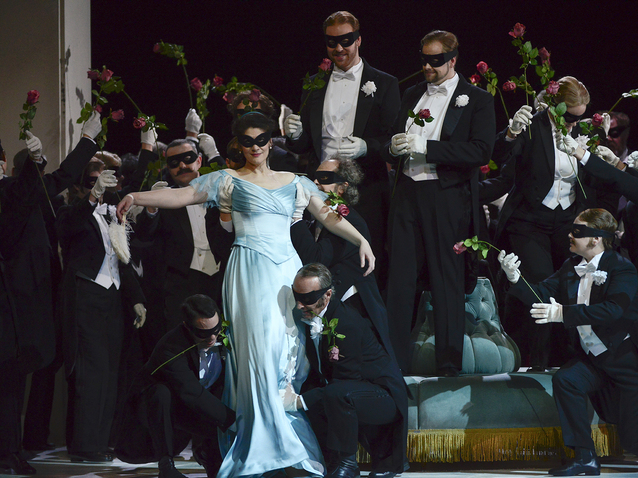 © Matthias Creutziger
© Matthias Creutziger
The Richard Strauss Tage, a kind of festival of the Semperoper Dresden, is dedicated to the Bavarian composer Richard Strauss, who has worked for several years at the renown opera house and especially colaborated with the Saxonian Staatskapelle. It was here, that his worldwide reputation as a composer has shown his first success. Several of his operas where first performed here, his major symphonic compositions took birth here. So this year within others saw the celebration of the centennial of the Alpensymphonie, a masterpiece of the composer actually dedicated to the orchestra, in grace for the yearlong support and fidelity. Richard Strauss lyric creations are linked with a great variety of female characters. A lot of social critics and psychological analysis are packed within a late romantic expressive and modern music. All the families existence and future is linked and invested into Arabella's education as an elegant and intelligent lady, in order to be best united with a rich aristocratic man - typical for the late 19th century in the Viennese society.
Anja Hateros has taken the part at a short notice due to the illness of Anne Schwanewillms, originally casted for this role. Her appearence in this role at Munich Festival this year was highly acclaimed, but in this production in Dresden, she presented herself as an actress too, becoming an incarnation of a young good looking Viennese girl of the upper society, well educated to some kind of snobby arrogance and ignorance, curious to discover the area of love and timid to actually get there. Her noble appearance, tallness and natural beauty just perfectly fits to this character and her immaculate voice with silver glitter, soft and secure tops and flexible legati makes her one of the best current interpreters of the demanding composer.
Bo Skovhus is the man, who finally wins the feelings of this young lady. Designed by the director, Florentine Klepper as a dum young eccentric landlord, based in the countryside, he is unfamiliar with the customs in the capital. Again, it is the natural presence on stage of the singer which contributes to the atmosphere of the evening. His elegant warm voice is sometimes covered by the orchestra which shows its affection for the music of Richard Strauss. Guided by his musical director, the acclaimed Richard Strauss expert Christian Thielemann, the musicians really warm up and demonstrate their discipline and mastership. Most of the hidden wit, emotions and social conflicts are demonstrated in the music and Christian Thielemann sculpts images out of the various instruments and their combination. Genia Kühmeier joins Anja Hateros as her beloved sister Zdenka, put in boy's clothes to minimize family spendings. Her golden voice shows affection, shines bright and feels well balanced in the lower end, fitting to a young boy as well as a girl. Her beloved soldier Matteo presents Benjamin Bernheim once again as a serious applicant in the guild of young tenors. He got the timbre and a flexible voice with a wide flavour in the height, safe tops and bright modulation. So he could have done fine with less power and pressure in his presentation.
The direction of Florentine Klepper did not contribute much to this splendid musical performance. Her interpretation of this elaborated lyric comedy lacks of the savoir-vivre and spirit. Key scenes get clumsy and emotions are kept under water - symbolic as in the famous last scene of the opera. The stage design of Martina Segna gets closer to the ambience of the plot in a mixture of Art deco and Biedermeier. The audience spends long and heartily applause to the loving couples of the evening and their orchestra together with the musical director.
Helmut Pitsch
the 08 of November, 2015 | Print
Comments